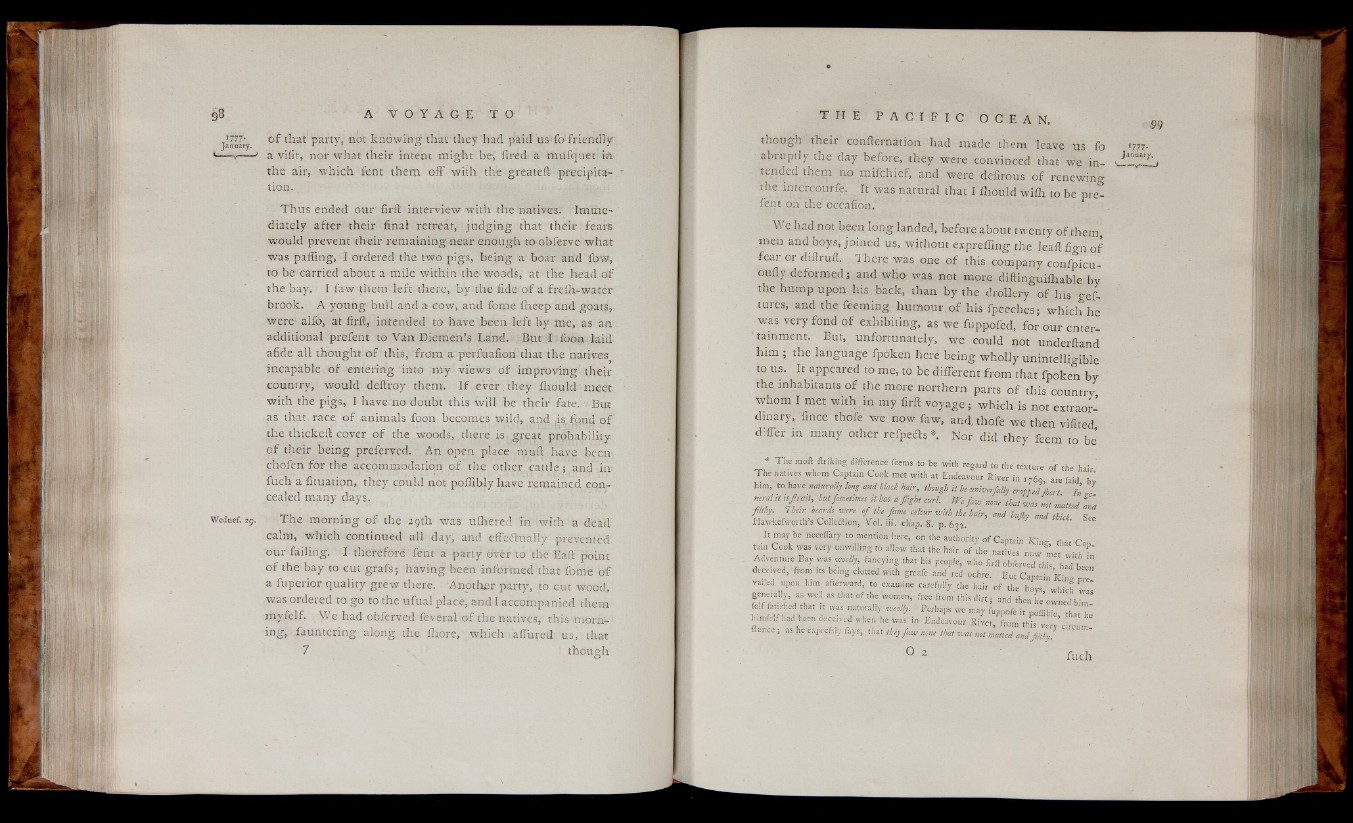
bliraiy ihiat party, not knowing that they had paid us fo-friendly
' . | a viiit, nor what their intent might be, fired a mufquet in
the air, which fent them off with the greafeffi precipita- I
tion.
Thus ended our firft interview with the natives. Immediately
after their final retreat, judging that their fears
would prevent their remaining near enough to obferve what
. was palling, I ordered the two pigs, being a boar and fow,
to be carried about a mile within the. woods, at the head of
the bay. Ifaw them left there, by the fide o f a frefli-water
brook. A young bull and a cow, and fome fheep and goats,
were1 alfo, at firft, intended to have been left by me, as an
additional prefent to Van Diemen’s Land. But I loon laid
afide all thought of this, from a perfuafion that the natives
incapable, of entering into my views of improving their
country, would deftroy them. If ever , they fhould meet
with the pigs, I have no doubt this will be their fate.;'/ But
as that race of animals foon becomes wild, and .is.fond of
the thickeft cover of the woods, there is. great, probability
o f their being preferved. An open place mail have been«
chofen for the accommodation of the other cattle ; and irr
fuch a fituation, they could not: poifibly have remained concealed
many days.,
Wednef. 29. The morning of the 29th was ufhered in with a dead
calm, which continued all day, and effectually prevented
our failing. I therefore'fent a party over to the Eaft point
of the bay to cut grafs; having been informed that fome of
a fuperior quality grew there. Another party, to cut wood,
was ordered to go to the ufual place, and I accompanied them
myfelf. We had obferved feveral of the natives, this morning,
fauntering-along the flaore, which affured us, that
7 though
though their conilernation had made them leave us fo >777-
abruptly the day before, they were convinced that we in- ■
tended them no mifchief, and were defirous of renewing
the intcrcourfe. It was natural that I fhould wifh to be prefent.
on the occafion.
We had not been long landed, before about twenty of them,
men and boys, joined us, without exprefling the leaft fign of
fear or diftruft. There was one of this company confpicu-
oufly deformed; and wlio was not more diftinguiihable by
the hump upon his back, than by the drollery of his gef-
tures, and the feeming humour of his fpeeches; which he
was very fond of exhibiting, as we fuppofed, for our enter-
•tainment. But, unfortunately, we could not underftand
him ; the language fpoken here being wholly unintelligible
to us. It appeared to me, to be different from that fpoken by
the inhabitants of the more northern parts o f this country
whom I met with in my firft voyage; which is not extraordinary;
fince thofe we now faw, and, thofe we then vifited
differ in many other refpetfts *. Nor did they feem to be
* The moil Unking difference feem. to be with regard to the texture o f the hair
The natives whom Captain Cook met with at Endeavour River in 1769 are faid b *
him, to have naturally long and black hair, though it be umverfally crotfed'Jhort / ’ *
^ f^ im e s ith a s -a jig h tc u r l. | ( g | g that was not,netted § § «
flth y . Their beards were o f the fame colour- with the hair,, and bujhy and thick
HawkefworthVColle&ion, Vol. iii. chap. 8. p. 632.
It may be neceflhry to mention here, on the authority of Captain Kin» rf, , o
tain Cook was very unwilling to allow that the hair of the natives now met with'in
Adventure Bay was woolly, fancyrng that his people, who firft ob/erved this, bad be n
deceived, from its being clotted with greafe. and^ red ochre. But Captain k in g pre
varied upon him afterward, to examine carefully the hair o f the boys, which C
■ E t e i S I th2t £he WOrten’ from «*>» M ®d then he owned bto
felf fanafied that rt was naturally woolly. Perhaps we may fuppofe it pdffi'bJe, that he
hrmfclf had been decervpi when he was in-Endeavour River, from this very clrcurr '
fiance ; as he exprefsiy fays, that they faw none that was not matted and filthy.